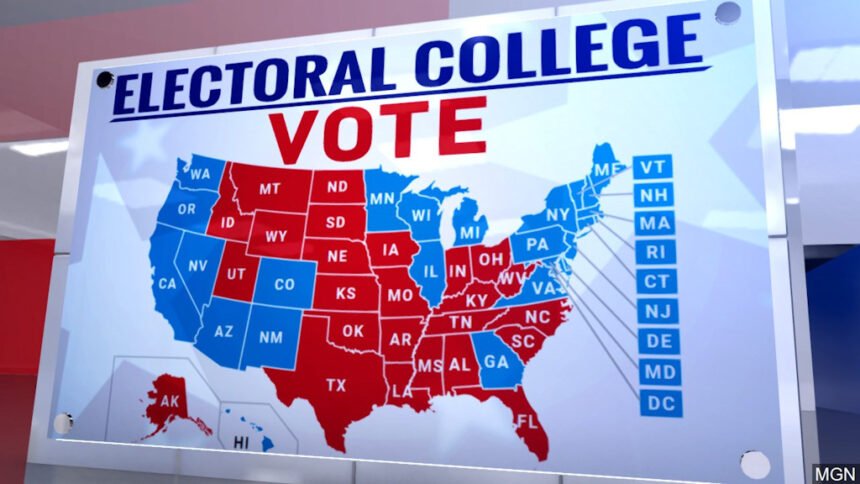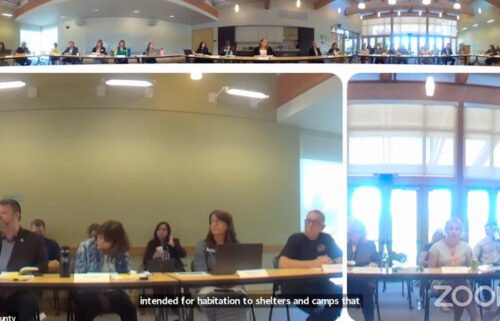Critics of Electoral College push for popular vote compact

SALEM, Ore. (AP) — When the Electoral College meets Monday, its detractors hope it marks the beginning of the end of a system that twice this century has vaulted the loser of the popular vote to the presidency.
This year’s presidential race provides the latest motivation for change to supporters of the National Popular Vote Interstate Compact. While Democrat Joe Biden scored a decisive win over President Donald Trump in both the popular vote and Electoral College, the race came down to narrow margins in a handful of swing states.
If the results had turned out differently in some of those states, Trump could have lost the popular vote for the second election in a row but gained the presidency because of the Electoral College system.
“It’s an old, ugly mess that frankly should have been obviated some time ago,” said Virginia House of Delegates member Mark Levine, a Democrat who introduced a bill that would have Virginia sign on to the National Popular Vote movement. It would compel member states to award their electoral votes to the winner of the nationwide popular vote.
Levine’s measure passed the Virginia House earlier this year. Passage by the Senate would bring the movement 13 electoral votes closer to its goal.
So far, 15 states and the District of Columbia have signed on.
For presidential candidates, 270 represents the number of Electoral College votes needed to secure a win. The move toward a national popular vote also is aiming for that magic number. It already has secured 196 and aims to gain more next year. Advocates hope, perhaps unrealistically, that it will be in place by the next presidential election in 2024.
Under the current system, each state’s electoral votes go to the candidate who won the popular vote in that state, with the runner-up getting nothing. Nebraska and Maine are the only exceptions.
National Popular Vote, the group pushing the compact, is focusing in 2021 on Virginia and eight other states: Arizona, Arkansas, Maine, Michigan, Minnesota, Nevada, North Carolina and Oklahoma. The initiative has made progress in those states by passing at least one legislative chamber, but didn’t clear the finish line, spokesman Patrick Rosenstiel said.
They have a combined total of 88 electoral votes, enough to surpass 270.
“We’ll focus on any states that offer a credible chance of enactment between now and the 2024 presidential election,” Rosenstiel said.
Success in those states is far from assured. In the modern era, the Electoral College has benefited Republican candidates — George W. Bush in 2000 and Trump in 2016 won the presidency after losing the popular vote. Of the states targeted next year, Republicans will control both houses of the legislature in Arizona, Arkansas, Michigan, North Carolina and Oklahoma, and one chamber in Minnesota.
Under the Electoral College, each state’s number of electoral votes equals the size of its congressional delegation. Wyoming, America’s least populous state, has two senators and one representative, so it gets three. California, the most populous state, has 55.
To win the White House, a presidential candidate must collect at least half the total 538 electoral votes plus one – or 270. This system has delivered a split presidential verdict five times, with a candidate winning the presidency despite losing the popular vote.
The U.S. is the only modern democracy with such a system, according to the Pew Research Center. Most others elect their leader by national popular vote or the parliamentary system in which the winning party chooses the head of government.
Opponents say the U.S. system violates the one person-one vote principle, encourages candidates to ignore states that are either firmly Democratic or Republican, and gives disproportionate power to voters in just a few states.
But Electoral College supporters say it adheres to federalism by preserving the role of states in presidential elections.
The 15 state legislatures that have passed a national popular vote bill since 2007 are all controlled by Democrats: California, Colorado, Connecticut, Delaware, Hawaii, Illinois, Maryland, Massachusetts, New Jersey, New Mexico, New York, Oregon, Rhode Island, Vermont and Washington.
The District of Columbia council, controlled by Democrats, also approved it, contributing three electoral votes from the nation’s capital.
Read more at: https://apnews.com/article/election-2020-joe-biden-donald-trump-elections-electoral-college-c31eb2fc3f07a02facc62c300029524f



